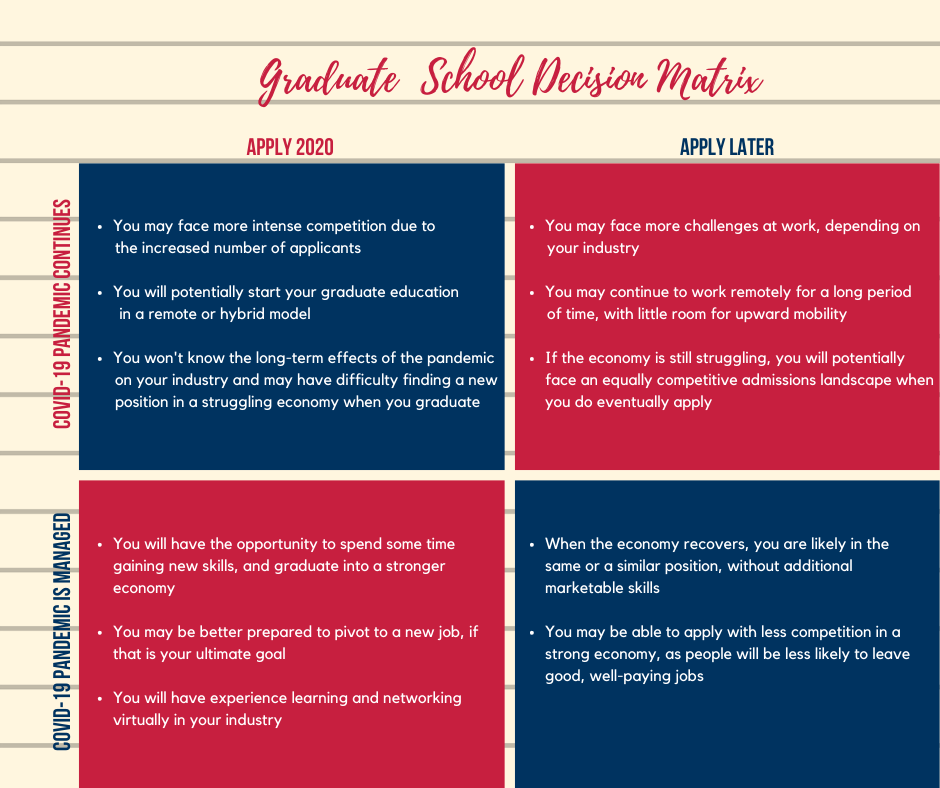While most of our blog readers are interested in assistance with undergraduate admissions to a four-year college, we also work with younger students applying to private high schools and older students/young professionals who are interested in a graduate degree.
In a typical application cycle we will generally work with four types of graduate school applicants:
Those seeking a more traditional path to a professional degree, such as an MBA or JD (we do not work with MD applicants).
Those seeking a specialized master’s degree program for an early-career jumpstart in the business world - some popular options include UVa (McIntire)'s MS Commerce, Vanderbilt (Owen)’s MS Finance, and Georgetown (McDonough)'s MS Management.
Those seeking a specialized professional master’s degree for an early-ish career jumpstart or boost in a non-business industry - for example, MPH programs, MEM programs, or MPA programs.
Those seeking an academic master’s or doctoral degree in a liberal arts field.
Not surprisingly, interest in our graduate school admissions consulting has risen substantially this year given the economy and increased competition, but sometimes the hardest decision is whether to pursue the degree now or wait a few years. It’s not like applying to college, where an undergraduate education is the obvious next step for a high school student.
Keep reading to learn more about whether graduate school is the right choice - and if you decide that you might need more targeted guidance, book a Graduate School Strategy Session!
1. Why now?
As previously mentioned, applications to graduate and professional schools are on the rise this cycle. This is often the case during an economic downturn, when students and professionals turn to continued education to combat layoffs or pivot to a new career. There will also be more deferrals in next cycle’s class, as some students chose not to pursue remote learning this fall.
The big caveat here is that just because there are more graduate school applications, that doesn’t mean that they are better. Applicants who are just looking for a place to wait out the pandemic will have rushed applications that don’t clearly articulate why they want to attend graduate school.
So, think about why you are applying to graduate school now. Is this a dream of yours, and a good time in your career to make a change? Have you thought through your reasons clearly, and worked with a consultant or trusted mentor to articulate your ambitions? Great! Your application is going to stand out. Are you applying to graduate school simply because you don’t know what else to do? Skip this cycle, and focus on defining your goals.
This matrix helps to condense some of our advice about applying to graduate or professional schools this cycle. As you can see, a lot depends on your industry and the progress of the COVID-19 pandemic.
2. Where am I heading?
If you weren’t scared off by #1, you probably have some idea of why you want a graduate degree. Having clear goals, whether for a business proposal or an academic manuscript, is essential to forming a successful graduate school application. Don’t lose sight of your goals, but do think critically about how you can best serve them.
If you are on a career path that excites you, and you still have room for upward mobility during COVID, you may choose to stay at a well-paying job and gain experience that will strengthen your application in the future. This is particularly true for younger applicants, who need more time to develop career experience. If the pandemic limits your upward mobility or your ability to pivot to a new career, graduate school may be your best option for progressing toward your goals.
If you’ve decided that applying is the right path for you, keep reading, and keep those goals in mind!
3. Articulate your story.
For most postgraduate degrees (with the exception of many law schools), you will be asked to write a statement of purpose that discusses your experience and future plans. You should use this opportunity to tell a cohesive story about yourself. Make sure that you demonstrate how your previous experience in school, extracurricular activities, and any work experience you have align with your future goals, and include specific information from your research about how the program you are choosing will help you achieve those goals.
At this point in your academic and professional career, schools do not want to hear about how you will be able to explore a lot of different topics. They want to know that you are focused on your next steps, and you’ve thought about exactly how their school will help you get there.
4. Polish your resume.
At this point in your career, you probably have a resume that you’ve used before, either for college applications or for the job or internship search. But that resume is likely not going to help you apply to graduate school. Specific programs are going to want to see very different things - a business school resume should look very different from the resume for a Ph.D. program. We help our clients tailor their resumes directly to their programs, but even on your own, make sure you highlight the skills and experience that will be most relevant to your desired program. Also, familiarize yourself with the conventions of resumes in your field. Are they usually a page, or can they be longer? How are they ordered? What type of aesthetic is most common?
5. Find your best fit (but keep rankings in mind!)
There are plenty of issues with U.S. News rankings for undergraduate institutions, and my general advice is to explore a college based on best fit, not based on rankings. This is true for graduate schools as well - but only to a point. You absolutely should not attend a school that will make you miserable just for a higher ranking. But particularly for graduate and professional schools, rankings can mean a lot.
BUT - another caveat! - it’s important to pay attention to the fact that exceptional programs in individual fields of study can outweigh an institution’s overall ranking. For example, UT Austin and Duke are (just) outside of the top-ten ranked MBA programs. But if you’re interested in oil and gas, UT Austin might be the best possible choice - far better than even the #1 ranked program. Same would go for Duke if you have an interest in energy or the environment. Do your research to see which schools are most highly regarded in your area of interest, so you can apply to the best possible programs for you.
All this to say, don’t settle for a school that isn’t the right fit. You can always reapply with more work experience, or with help from us!
There are a TON of variables when it comes to a graduate school application, but that is part of why we enjoy the process. And from a selfish perspective - it is so much fun to reconnect with former students. Last night I got to meet with one of my all-time favorite “kids” (he is definitely not a kid anymore) who I hadn’t seen since probably 2014 or 2015 - it all blends together. So rewarding!!




